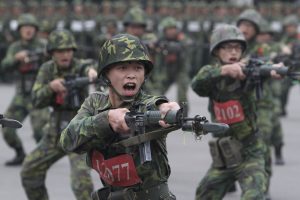As the world comes to grips with Russia’s ongoing invasion of Ukraine, the questions surrounding why Western deterrence has seemingly failed to prevent such a situation will be hotly debated. But beyond the implications for the United States and Europe, perhaps the most common analysis being made, rightly or not, compares Russia President Vladimir Putin’s designs on Ukraine with Chinese leader Xi Jinping’s machinations regarding Taiwan (formally the Republic of China, or ROC), a de facto independent state that Beijing claims to be part of the People’s Republic of China (PRC).
Some observers have opined that a weak response by the United States and its allies in Europe will embolden Xi to undertake a military takeover of the island. U.S. Ambassador to the U.N. Linda Thomas-Greenfield addressed this line of thinking in an interview with CNN when she stated, “As it relates to Taiwan and China, we are committed to protecting the security and supporting the security of the people of Taiwan… if China is making efforts toward Taiwan because of what they see happening in Ukraine, these are two different types of situations.”
The Biden administration’s repeated invocations of a possible “World War III” to deflect calls for greater U.S. material support for Ukraine’s defense are probably not helping the relevant optics in Asia. Yet the United States should be much more concerned with its day-to-day deterrence signaling toward China over Taiwan, which is woefully inadequate and prepositioned on dated calculations that make it ineffective.
Briefly explained, the roots of strategic ambiguity are found in the 1979 Taiwan Relations Act (TRA), which states that the United States will maintain the capacity to defend Taiwan but does not state whether or not the United States would actually militarily intervene if the PRC attacked – ultimately this remains a U.S. presidential decision. Strategic ambiguity has allowed the United States to protect its normalized relations with China from being completely derailed by a Taiwan-U.S. alliance while still threatening to quash a Chinese cross-strait attack. It has also helped prevent Taiwan’s more independence-leaning leaders from assuming they had a blank check from Washington to declare de jure independence, which would risk provoking a China-U.S. war in the process.
This framework worked well for American interests in a time when U.S. military power so overmatched China’s that the mere possibility of U.S. intervention was enough to outweigh the benefits of war in Chinese regime calculations, and along with it the benefits of China’s dedicated preparations for a cross-strait attack. Even as Beijing’s military power grew alongside its economy – and although Beijing probably judged that U.S. resolve to undertake military intervention was capricious and vulnerable to its diplomatic pressures (especially during periods of obvious U.S. frustration with Taiwan, such as during the Chen Shui-bian administration) – PRC inaction was in strong part decided by the danger of facing the United States’ superior military might.
Unfortunately, however, it is now more likely than not that this CCP leadership calculation has changed, and not only as a function of China’s gradually rising strength. China’s military power is certainly the first factor: Militarily the PRC can now finally hope to defeat a U.S. intervention in a Taiwan Strait conflict. Just as importantly, though, the second key factor is paramount leader Xi Jinping’s apparent willingness to take the political risks inherent to a cross-strait invasion scenario.

































